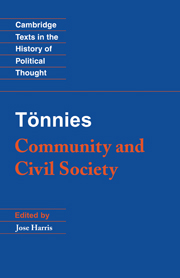Book contents
- Frontmatter
- Contents
- Acknowledgements
- General introduction
- Chronology of Tönnies's life and career
- A note on the texts and further reading
- A note on translation
- Glossary
- COMMUNITY AND CIVIL SOCIETY
- Book One A general classification of key ideas
- Book Two Natural will and rational will
- Section 1 The forms of human will
- Section 2 Explanation of the dichotomy
- Section 3 Practical implications
- Book Three The sociological basis of natural law
- Appendix: Conclusions and future prospects
- Index
- CAMBRIDGE TEXTS IN THE HISTORY OF POLITICAL THOUGHT
Section 2 - Explanation of the dichotomy
Published online by Cambridge University Press: 05 June 2012
- Frontmatter
- Contents
- Acknowledgements
- General introduction
- Chronology of Tönnies's life and career
- A note on the texts and further reading
- A note on translation
- Glossary
- COMMUNITY AND CIVIL SOCIETY
- Book One A general classification of key ideas
- Book Two Natural will and rational will
- Section 1 The forms of human will
- Section 2 Explanation of the dichotomy
- Section 3 Practical implications
- Book Three The sociological basis of natural law
- Appendix: Conclusions and future prospects
- Index
- CAMBRIDGE TEXTS IN THE HISTORY OF POLITICAL THOUGHT
Summary
A concentrated mass of natural, essential will may be compared to a concentated mass of arbitrary, calculative, rational will, in the same way as the organic structure and individual organs of an animal body may be compared to a piece of apparatus or a purpose-built machine. It is easier to study the phenomena being compared if we think of them as visible objects, and an understanding of the contrast between the psychological concepts presented here can be gained from seeing them in this way. Mechanical equipment and biological organs have in common the fact that they contain and represent an accumulation of horse-power or energy which both embodies and increases the total energy of the systems to which they belong. In both cases they possess their own specific strength only in relation to this overall energy and their dependence on it.
They differ, however, in their origins and qualities. An organ is self-generating; additional and more specialised powers are developed to a greater or lesser degree by repeated straining after a particular activity – either of the entire organism or of one of its constituent parts – which the organ in its fully developed state has to achieve. A piece of equipment is made by human hand, which makes use of extraneous material and is given a specific structure and form.
- Type
- Chapter
- Information
- Tönnies: Community and Civil Society , pp. 132 - 151Publisher: Cambridge University PressPrint publication year: 2001



